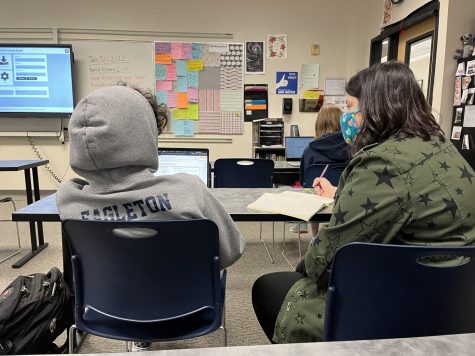Student-Led Conferences: A Chance for Reflection?
January 25, 2022
Many Emery/Weiner School students have been carefully crafting academic progress reports for their student-led conferences to be presented to parents on Jan. 26 in order to reflect, analyze, and grow.
The goal of the conferences, announced by the Head of Upper School Joe Weinstein-Sears in December, is for students to work with their advisors to create presentations that highlight academic strengths, weaknesses, and progress in the first semester, and strategies to improve in the second semester. Weinstein-Sears also hopes students will learn to take a step back and use “metacognition skills” to better their learning and study habits. He believes “it’s really important for students to think about their own thinking and reflect upon their own learning.”
Emery sophomore Lauren Miller believes that the conferences are important because they permit students to reflect on what they have done and “improve for the second semester.” Students are required to give themselves feedback on how they can do better in each class, simultaneously allowing them to look at who they were and who they can be as a student.
Each student’s academic advisor and parent/guardian joins the conferences. Emery holds a strong belief that it is important for a student to maintain and develop a network of people who are able to support them throughout their educational journey. Weinstein-Sears expresses this belief by explaining that both guardians and advisors “know a great deal about how to best support a student,” so their attendance can support the student on their journey of self reflection and growth.

Many schools across the country participate in parent-teacher conferences, where the teacher discusses each student’s progress with the student’s parent. Emery, however, changed the narrative of educational conferences to include the student in the conference, not only as a participant but as the leader of the conversation. Weinstein-Sears explains that faculty members “want students to take ownership of what’s happening in the classroom,” as Weinstein-Sears believes “being accountable is not a bad thing.”
While some students believe that student-led conferences are beneficial, others, specifically second-semester seniors, disagree. An anonymous senior explained that they “understand how the conferences would be beneficial for freshmen, sophomores, and juniors but as second-semester seniors, there is no purpose for the conferences.”
They expressed that if Mr. Weinstein-Sears wanted to extend the conferences for seniors then they should have been at the beginning of the year, “as an encouragement to keep trying.” However, the senior still conveys doubt in the conferences’ ability to impact a student’s academics, explaining that “As a senior, specifically a second-semester senior who is committed to college, my parents already know and appreciate my academic standing and I am responsible enough, on my own, to manage my grades in these last few months of my senior year.” Additionally, another senior shared that “because most of my classes are one semester, it is not possible to reflect on last semester and improve within specific classes as all but 2 of my classes are already over.”
The controversy over student-led conferences is new to the Upper School, as student-led conferences have existed in the Middle School in previous years, but have not yet been implemented in the Upper School due to the Covid-19 pandemic. Weinstein-Sears believes the addition of the conferences in the Upper School community is “long-overdue.” and hopes that students will leave the experience with a positive mindset. He explains that while students might not see the benefit of the conferences right away, “in the long run, [he] hopes they’ll see the value of being forced to stop, pause and reflect.”